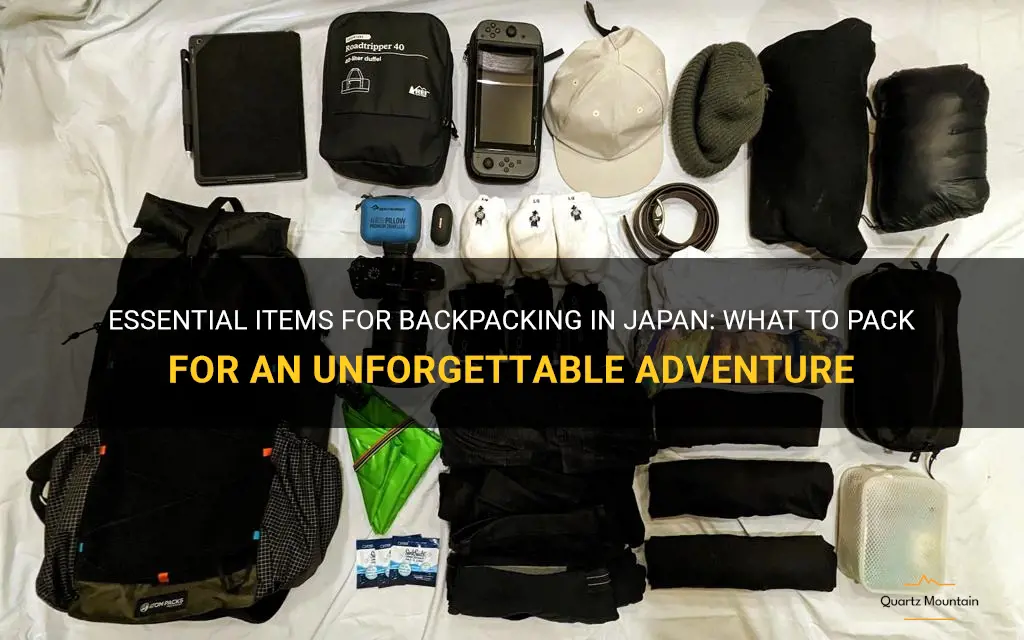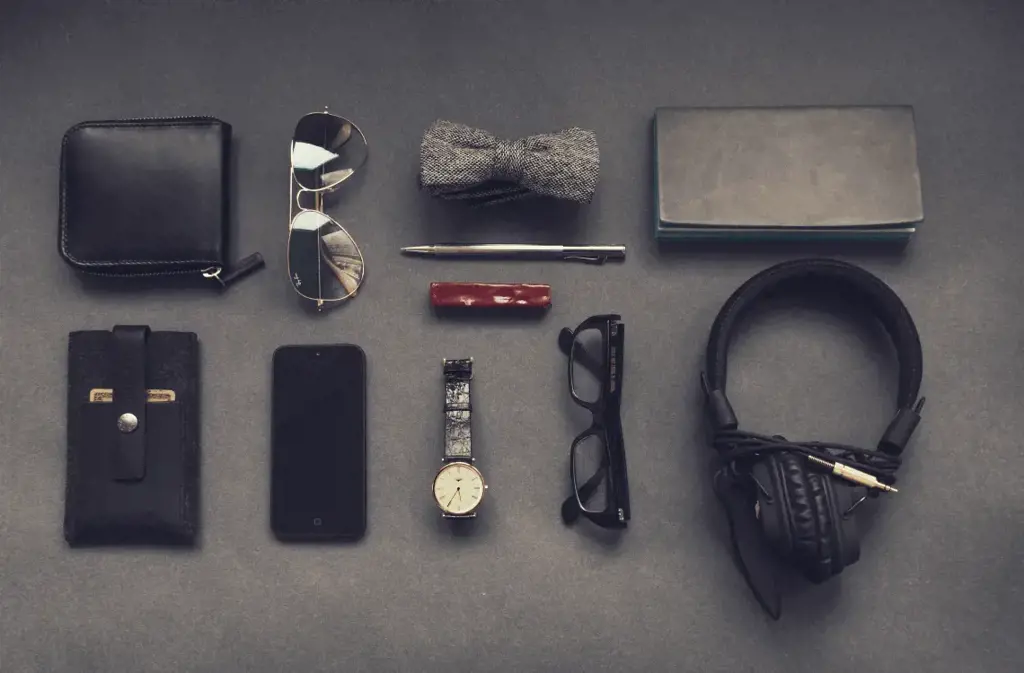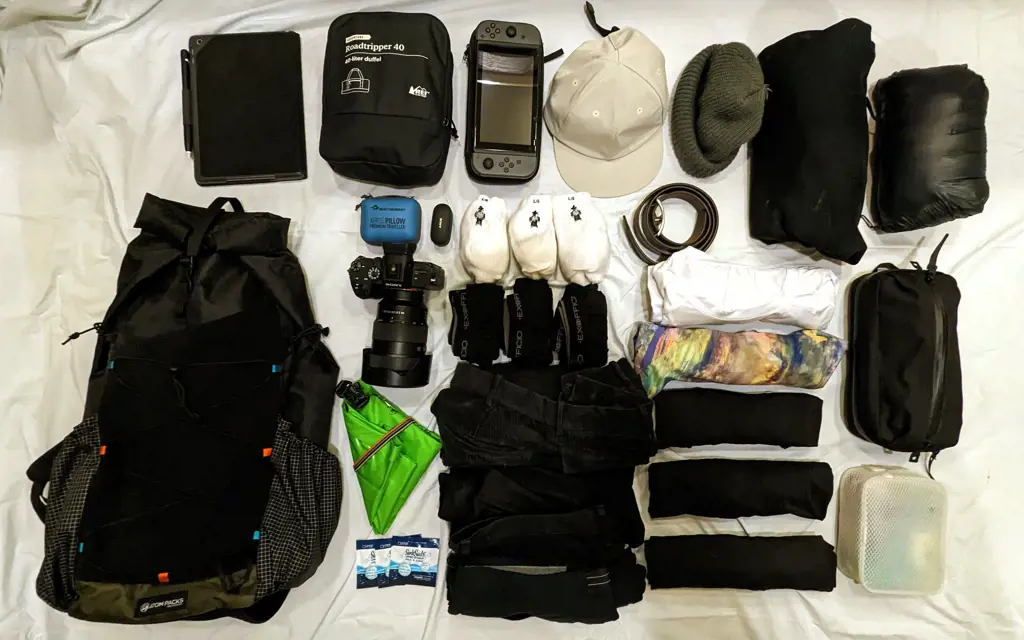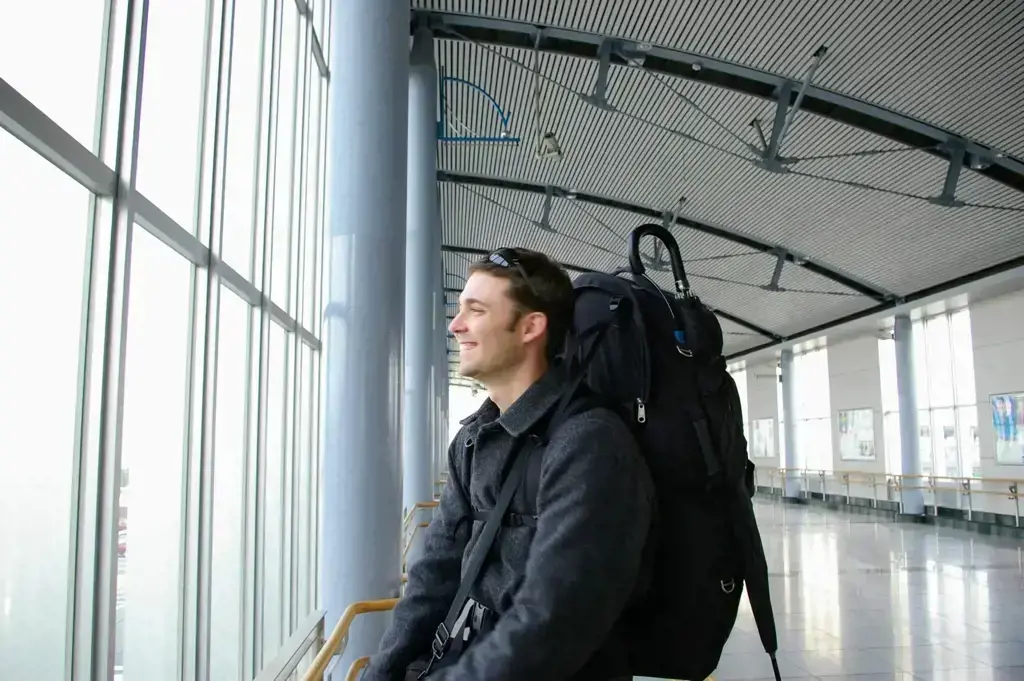
If you're planning a backpacking adventure in Japan, you're in for an unforgettable experience. Japan offers a unique blend of ancient traditions and ultra-modern cities, picturesque landscapes, and vibrant street markets. Whether you're planning to hike through the breathtaking mountains or explore the bustling streets of Tokyo, it's essential to come prepared with the right gear. In this guide, we'll outline the essential items you'll need for backpacking in Japan, ensuring you have a comfortable and enjoyable adventure. So read on to find out what to pack for your unforgettable journey in the Land of the Rising Sun.
What You'll Learn
- What are the essential items to pack for backpacking in Japan?
- Are there any specific clothing items or styles that are recommended for backpackers in Japan?
- Is it necessary to bring a backpacking stove or cooking equipment, or are there easily accessible food options in Japan?
- Are there any specific electronics or gadgets that are useful to have while backpacking in Japan?
- Are there any cultural considerations to keep in mind when deciding what to pack for backpacking in Japan?

What are the essential items to pack for backpacking in Japan?

When planning a backpacking trip to Japan, it's important to pack essential items that will ensure a smooth and comfortable journey. Japan offers a unique blend of traditional and modern attractions, making it an exciting destination for backpackers. To make the most of your trip, here are some essential items to pack:
- Backpack: A sturdy backpack is essential for carrying your belongings throughout the trip. Look for one with multiple compartments to keep your items organized and easily accessible.
- Travel Documents: Don't forget to bring your passport, visa (if required), and any other necessary travel documents. It's also a good idea to carry photocopies of these documents in case of loss or theft.
- Comfortable Shoes: Japan is a country that requires a lot of walking, so it's crucial to pack a pair of comfortable walking shoes. Opt for shoes that are lightweight, breathable, and provide good support.
- Weather-appropriate Clothing: Japan experiences diverse weather throughout the year, so it's important to pack clothing suitable for the season you'll be visiting. In the summer, lightweight and breathable fabrics are ideal, while in the winter, warm layers and a good jacket are necessary.
- Universal Power Adapter: Japan uses a different type of power outlet compared to many other countries, so a universal power adapter is a must-have. This will allow you to charge your electronic devices without any issues.
- Travel Guidebook: While there is a wealth of information available online, having a physical travel guidebook can be beneficial. It will provide you with detailed maps, recommendations, and valuable insights into local culture and customs.
- Portable Wi-Fi Router: Staying connected is essential for a smooth backpacking trip. Consider renting a portable Wi-Fi router, which will provide you with reliable internet access throughout your journey.
- Pocket-Sized First Aid Kit: Accidents can happen during your travels, so it's important to have a basic first aid kit on hand. Include items such as band-aids, pain relievers, antiseptic wipes, and any necessary prescription medication.
- Cash and Debit/Credit Cards: While Japan is mostly a cash-based society, credit and debit cards are accepted at most major establishments. It's a good idea to carry both cash and cards for convenience.
- Travel Insurance: Make sure to purchase travel insurance to protect yourself against any unforeseen circumstances such as illness, injuries, or trip cancellations. It's always better to be prepared.
Additionally, it's a good idea to pack some smaller items that can come in handy during your backpacking trip. These may include a travel towel, a portable phone charger, a compact umbrella, a reusable water bottle, and a small padlock for hostel lockers.
By packing these essential items, you'll be well-prepared to embark on an unforgettable backpacking adventure in Japan. Remember to pack light and only bring what you absolutely need, as you'll likely want to pick up souvenirs and mementos along the way. Happy backpacking!
What You Need to Pack for VSG Surgery: Essential Items for a Successful Recovery
You may want to see also

Are there any specific clothing items or styles that are recommended for backpackers in Japan?

When it comes to backpacking in Japan, it's important to dress appropriately for the weather and cultural norms. Japan experiences four distinct seasons, each with its own unique climate and clothing requirements. Additionally, Japan is a country with a strong emphasis on fashion, and there are certain styles and clothing items that are popular among locals and tourists alike.
One of the most important clothing items for backpackers in Japan is a good-quality, waterproof jacket. Japan is known for its unpredictable weather, and it's not uncommon for a sunny day to turn into a torrential downpour. It's important to invest in a waterproof jacket that can keep you dry and warm during these sudden showers. Additionally, a light, packable jacket is useful for layering in case the weather changes throughout the day.
In terms of clothing styles, Japanese fashion tends to be more conservative and modest compared to Western styles. It's a good idea to pack clothes that cover your shoulders and knees, especially if you plan on visiting temples or other religious sites. Loose-fitting and breathable clothes are ideal for the hot and humid summers in Japan, while layering is key for the colder winter months.
When it comes to footwear, comfortable shoes are essential for exploring the streets of Japan. It's best to pack a pair of sturdy walking shoes or sneakers that can withstand long days of walking and sightseeing. Additionally, it's customary to remove your shoes when entering traditional Japanese homes, temples, and certain restaurants, so slip-on shoes or sandals are also recommended.
For female backpackers, it's important to note that Japan can be quite conservative when it comes to fashion. While there is freedom to express oneself through clothing, it's generally a good idea to avoid overly revealing or provocative outfits, especially when visiting more traditional areas of the country.
It's also worth mentioning that Japan is known for its fashion-forward street style and shopping opportunities. If you're interested in staying on top of the latest trends or purchasing unique clothing items, be sure to visit popular shopping districts such as Harajuku in Tokyo or Shinsaibashi in Osaka. These areas are not only great for shopping but also for people-watching and getting inspired by the local fashion scene.
In conclusion, when backpacking in Japan, it's important to pack clothing items that are appropriate for the weather and cultural norms. A good-quality waterproof jacket, comfortable walking shoes, and modest, layered clothing are some of the key items to consider. Additionally, it's worth exploring Japan's fashion scene and incorporating some local styles into your travel wardrobe. By dressing appropriately and embracing the local fashion, you'll not only ensure your comfort but also immerse yourself in the unique cultural experience that Japan has to offer.
Essential Packing List for Backing Europe: What to Pack for Your Adventure
You may want to see also

Is it necessary to bring a backpacking stove or cooking equipment, or are there easily accessible food options in Japan?

When preparing for a backpacking trip in Japan, one of the key considerations is whether or not to bring a backpacking stove or cooking equipment. Japan is known for its delicious cuisine and easy accessibility to food options, but is it necessary to cook while on the trail?
While there are certainly plenty of food options available in Japan, whether it be convenience stores, street food vendors, or restaurants, bringing a backpacking stove can still be a wise decision. Here are a few reasons why:
- Cost: Dining out in Japan can be expensive, especially in tourist areas or major cities. By bringing a backpacking stove, you can save money by preparing your own meals. This is particularly beneficial for extended trips or budget-conscious travelers.
- Dietary Restrictions: If you have specific dietary restrictions or preferences, it can be challenging to find suitable options while on the trail. Having a backpacking stove allows you to have more control over your meals and ensure that you are getting the nutrients you need.
- Remote Areas: While Japan is a highly developed country with easy access to food, there are still remote areas where food options may be limited. Having a backpacking stove ensures that you have a reliable way to cook meals even in these remote locations.
If you do decide to bring a backpacking stove, there are a few options to consider:
- Lightweight Stove: Look for lightweight backpacking stoves that are compact and easy to carry. There are many options available on the market, ranging from simple gas stoves to more advanced multi-fuel stoves. Consider your specific needs and choose a stove that suits your requirements.
- Fuel Availability: Ensure that the type of fuel your stove requires is readily available in Japan. Most backpacking stoves use either canister fuel or liquid fuel. Canister fuel can be found in outdoor stores or convenience stores, while liquid fuel may be more challenging to find. Plan accordingly and bring enough fuel for your trip.
- Cooking Equipment: In addition to the stove, you will also need to bring cooking equipment such as pots, pans, utensils, and a lightweight stove stand. Opt for lightweight and durable options that are suitable for backpacking.
While it may not be necessary to bring a backpacking stove or cooking equipment for every trip in Japan, having these tools can offer flexibility, savings, and the ability to enjoy home-cooked meals even while on the trail. Consider your specific needs, duration of the trip, and access to food options before making a decision. Remember to check local regulations and guidelines regarding open fires or cooking restrictions in certain areas. With proper planning and preparation, you can have a delightful backpacking experience in Japan while enjoying delicious meals along the way.
Essential Items to Pack for a Trip to Acadia National Park
You may want to see also

Are there any specific electronics or gadgets that are useful to have while backpacking in Japan?

Japan is a technologically advanced country that offers numerous conveniences to travelers. While backpacking through Japan, it can be immensely helpful to have the right electronics and gadgets to enhance your experience and make your journey more seamless. Here are some specific electronics and gadgets that are highly recommended for backpackers in Japan:
- Portable Wi-Fi Router: Staying connected is essential while traveling, especially in a foreign country. Japan has a reliable and widespread network, but to avoid the hassle of finding Wi-Fi hotspots, consider investing in a portable Wi-Fi router. These pocket-sized devices allow you to have your own personal Wi-Fi network wherever you go, making it easy to access maps, translation apps, and stay connected with family and friends.
- Pocket Translator: While English is widely spoken in major cities, smaller towns and rural areas may have limited English proficiency. A pocket translator can be a lifesaver when trying to communicate with locals or navigate public transportation. Look for models that offer real-time translation and support multiple languages to ensure smooth communication.
- Universal Power Adapter: Japan uses a unique electrical outlet system, so it's essential to have a universal power adapter to charge your electronic devices. These adapters typically have multiple plug options and can be used in several countries, making them a smart investment for any frequent traveler.
- Smartphone with Useful Apps: Your smartphone will be your go-to gadget throughout your backpacking journey. Make sure to have essential apps installed, such as a translation app, a map app (Google Maps or a local map app like Yahoo Map), and a transportation app like Japan Travel. These apps will be invaluable in navigating Japan's efficient but complex transportation system and finding tourist attractions.
- Cashless Payment Options: Japan is moving towards a cashless society, with many establishments accepting credit cards or mobile payment options such as Suica or Pasmo cards. These cards can be used for public transport, vending machines, stores, and even some restaurants. Having a mobile payment app or a reloadable card will make your transactions quick and convenient.
- Portable Battery Pack: With all the time spent out and about exploring, your smartphone's battery can drain quickly. Carrying a portable battery pack ensures that you can charge your devices on the go and never be caught without power. Look for a high-capacity and lightweight power bank to avoid any unnecessary bulk in your backpack.
- Noise-Canceling Headphones: Japan's bustling cities can be noisy, especially during rush hours or in crowded areas. Noise-canceling headphones can provide a peaceful escape during long train rides or while trying to relax in a busy café. Invest in a pair that offers good noise cancellation and is comfortable to wear for extended periods.
In conclusion, having the right electronics and gadgets can greatly enhance your backpacking experience in Japan. From staying connected with portable Wi-Fi routers to overcoming language barriers with pocket translators, these tools will make your journey more seamless and enjoyable. So, pack these essentials, and you'll be well-prepared to explore the wonders of Japan.
Essential Items to Pack for a Trip to Martha's Vineyard
You may want to see also

Are there any cultural considerations to keep in mind when deciding what to pack for backpacking in Japan?

When preparing for a backpacking trip in Japan, it is important to consider the cultural norms and customs of the country. Japan has a unique culture, and being aware of certain considerations can help ensure a positive and respectful experience.
- Dress modestly: Japan is a conservative country when it comes to dress. It is advisable to pack clothing that covers the shoulders and knees, especially when visiting religious sites or traditional areas. Avoid clothing with offensive or overly bold designs.
- Remove shoes indoors: In Japan, it is customary to remove your shoes before entering someone's home, traditional inns (ryokans), temples, and some restaurants. It is a good idea to pack slip-on shoes or sandals that can easily be taken off and put on.
- Pack adaptors and chargers: Japan uses a different electrical outlet and voltage system than many other countries. Make sure to bring a universal adaptor and check if your electronics are compatible with Japan's 100V power supply. If not, you might need a voltage converter.
- Respect personal space and silence: Japanese people value personal space and tend to be quiet in public. Keep noise levels to a minimum, especially on public transportation. Be mindful of others and avoid talking loudly or causing disruptions.
- Consider cultural gifts: In Japan, it is customary to bring small gifts when visiting someone's home, particularly if you will be staying overnight. These gifts are called "omiyage" and can be something representative of your home country or something special from a local area you visited.
- Follow proper etiquette in temples and shrines: When visiting temples and shrines, it is important to be respectful. Avoid loud conversations, smoking, or taking photos in areas where it is prohibited. Be mindful of the signs and follow any specific instructions given.
- Learn basic greetings and phrases: Although many Japanese people can understand basic English, making an effort to learn a few simple greetings and phrases can go a long way in fostering positive interactions. Knowing how to say "hello," "thank you," and "excuse me" in Japanese will be appreciated by the locals.
- Use public transportation responsibly: Japan's public transportation system is known for its efficiency and cleanliness. Be mindful of designated seating areas for elderly, pregnant, or disabled individuals. Avoid eating or drinking on trains unless it is specifically allowed.
Remember that Japan has a rich cultural heritage, and being aware of these considerations will help you blend in and show respect for the local customs. By packing appropriately and respecting the cultural norms, you will have a more enjoyable and fulfilling backpacking experience in Japan.
Essential Items to Pack for a Trip to Kauai
You may want to see also
Frequently asked questions
The weather in Japan can vary depending on the season and region. In general, spring (March to May) and autumn (September to November) are considered the best times to go backpacking due to mild temperatures and beautiful scenery. Summer (June to August) can be hot and humid, while winter (December to February) can be cold and snowy, especially in the northern regions.
When packing for a backpacking trip in Japan, it's important to consider the weather and activities you plan to do. Essential items include comfortable walking shoes, lightweight clothing, a rain jacket or umbrella, a good backpack, a hat and sunglasses for sun protection, and a refillable water bottle. Additionally, you may want to pack a portable charger, a travel adapter for your electronics, a towel, toiletries, and any necessary medication.
Yes, there are a few cultural considerations to keep in mind when backpacking in Japan. It's important to be mindful of Japanese etiquette, such as bowing when greeting someone, removing your shoes before entering a home or certain establishments, and using chopsticks correctly. It's also a good idea to learn a few basic Japanese phrases or bring a translation app to help communicate with locals. Lastly, be respectful of local customs and traditions, such as keeping noise levels down and not eating or drinking while walking.
Japan offers a wide range of stunning destinations for backpackers. Some must-visit places include Tokyo, the bustling capital city known for its neon lights and vibrant street culture; Kyoto, home to beautiful temples, gardens, and traditional geisha districts; Osaka, a food lover's paradise with its street food and vibrant nightlife; Hiroshima and Miyajima, where you can learn about Japan's history and visit the iconic Itsukushima Shrine; and Hokkaido, a region known for its stunning nature, hot springs, and skiing opportunities.
Japan is known for its safety and low crime rate, making it a relatively safe destination for solo travelers. However, it's always important to take basic safety precautions, such as keeping your belongings secure and being aware of your surroundings, especially in crowded areas. It's also a good idea to research and follow any travel advisories or safety guidelines from your government or relevant authorities.







